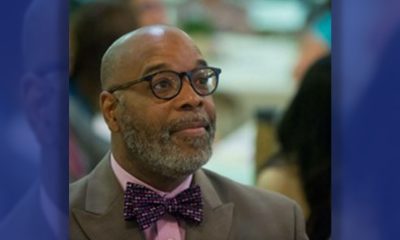Arts and Culture
Opinion: Remembering the Message of Christmas


Rev. Jesse Jackson Sr.
On Wednesday, Christmas will be celebrated by millions of people across this country and across the world. Joy surrounds the holiday, with music in the air, lights on homes and lampposts, families gathering, presents exchanged and blessings shared.
For some, Christmas is a difficult time — for the poor, for separated families, for the lonely, for the imprisoned and the sick. Each year at this time, I use this column to recall the true meaning of Christmas.
Christmas is literally the mass for Christ, marking the birth of Jesus. He was born under occupation. Joseph and Mary were ordered to go far from home to register with authorities. The innkeeper told Joseph there was no room at the inn. Jesus was born on a cold night in a stable, lying in a manger, an “at-risk baby.” His earthly father was a carpenter. Santa Claus wasn’t around — he is an invention of 19th century Europe.
Jesus was born at a time of great misery and turmoil, with his country under Roman occupation. Prophets predicted that a new Messiah was coming, a King of Kings, one who would rout the occupiers and free the people. Many expected a mighty warrior— like the superheroes of today’s movies — who would mobilize an army to defeat Rome’s occupying legions.
Fearing the prophecy, the Roman King Herod ordered the “massacre of the innocents,” the slaughter of all boys two and under in Bethlehem and the nearby region.
Jesus confounded both Herod’s fears and the peoples’ hopes. He was a man of peace, not of war. He gathered disciples, not soldiers. He began his ministry by quoting Isaiah 62:1: “The Lord has anointed me to bring good news to the poor.” We will be judged, he taught us, by how we treat “the least of these,” by how we treat the stranger on the Jericho Road. He called on us to feed the hungry, to clothe the naked, to care for the sick, to offer aid to the refugee.
It’s an extraordinary story. Jesus was a liberator, but by his words and his example, not his sword. He converted rather than conquered. He accumulated no worldly wealth. He threw the money lenders from the temple. During his ministry, he owned no home, no land, and had no regular paycheck. His time with us was too brief, and he was crucified for his ministry.
And yet, he succeeded beyond all expectation to transform the world. The Prince of Peace, he taught us that peace is not the absence of violence; it is the presence of justice and righteousness.
These days, the mass for Christ too often is viewed as a holiday and a payday for Santa, rather than a holy day, more secular than sacred. It is a time of sales, shopping and Santa, when its focus should be on the poorest among us. It is a time to stop a moment and take stock of where we are in light of the mission to bring “good news to the poor.”
There is good news: unemployment is down, poverty is down, incomes have slowly begun to rise. We continue to lock up more people than any nation in the world, but at both the state and federal level, small steps are being taken to reduce the number of nonviolent offenders who are incarcerated.
But surely, we have a long way to go. We are ignoring a climate crisis that threatens all of God’s creation. The U.S. continues to waste lives and literally trillions in wars without end and without apparent purpose. Inequality is at record extremes, and the tax cut Congress passed is making it worse.
Millions still struggle in this rich country to secure adequate food to eat, yet the administration is cutting support for food stamps that allow the working poor to feed their families. On our borders, the administration descended to tearing babies away from their mothers and keeping so many locked up that we have no facilities to house them. Health care, a basic human right, remains unaffordable for too many. Homelessness is rising, as adequate housing is priced out of the reach of more and more in our major cities.
Jesus was not a partisan, but his birth was immensely political — both in the expectations of the people and the fears of the occupiers. Instead of turning us on one another, he called us to our highest selves. We should not let the deeper meaning of Christmas be lost in the wrappings.
In Chicago on Christmas Day, I will go with my family — as we do every year — to visit the prisoners at the Cook County Jail, one of the largest jails in this country. That reflects the real meaning of the Christmas story.
In this secular age, let us remember the message of Christmas. Jesus demonstrated the astonishing power of faith, hope and charity, the importance of love. He showed that people of conscience can make a difference, even against the most powerful oppressor.
He demonstrated the strength of summoning our better angels, rather than rousing our fears or feeding our divisions. This Christmas, this surely is a message to remember.
Merry Christmas, everybody.
Advice
BOOK REVIEW: Let Me Be Real With You
At first look, this book might seem like just any other self-help offering. It’s inspirational for casual reader and business reader, both, just like most books in this genre. Dig a little deeper, though, and you’ll spot what makes “Let Me Be Real With You” stand out.

By Terri Schlichenmeyer
Author: Arshay Cooper, Copyright: c.2025, Publisher: HarperOne, SRP: $26.00, Page Count: 40 Pages
The hole you’re in is a deep one.
You can see the clouds above, and they look like a storm; you sense the wind, and it’s cold. It’s dark down there, and lonesome, too. You feel like you were born there — but how do you get out of the deep hole you’re in? You read the new book “Let Me Be Real With You” by Arshay Cooper. You find a hand-up and bring someone with you.
In the months after his first book was published, Cooper received a lot of requests to speak to youth about his life growing up on the West Side of Chicago, his struggles, and his many accomplishments. He was poor, bullied, and belittled, but he knew that if he could escape those things, he would succeed. He focused on doing what was best, and right. He looked for mentors and strove to understand when opportunities presented themselves.
Still, his early life left him with trauma. Here, he shows how it’s overcome-able.
We must always have hope, Cooper says, but hope is “merely the catalyst for action. The hope we receive must transform into the hope we give.”
Learn to tell your own story, as honestly as you know it. Be open to suggestions, and don’t dismiss them without great thought. Know that masculinity doesn’t equal stoicism; we are hard-wired to need other people, and sharing “pain and relatability can dissipate shame and foster empathy in powerful ways.”
Remember that trauma is intergenerational, and it can be passed down from parent to child. Let your mentors see your potential. Get therapy, if you need it; there’s no shame in it, and it will help, if you learn to trust it. Enjoy the outdoors when you can. Learn self-control. Give back to your community. Respect your financial wellness. Embrace your intelligence. Pick your friends and relationships wisely. “Do it afraid.”
And finally, remember that “You were born to soar to great heights and rule the sky.”
You just needed someone to tell you that.
At first look, this book might seem like just any other self-help offering. It’s inspirational for casual reader and business reader, both, just like most books in this genre. Dig a little deeper, though, and you’ll spot what makes “Let Me Be Real With You” stand out.
With a willingness to discuss the struggles he tackled in the past, Cooper writes with a solidly honest voice that’s exceptionally believable, and not one bit dramatic. You won’t find unnecessarily embellished stories or tall tales here, either; Cooper instead uses his real experiences to help readers understand that there are few things that are truly insurmountable. He then explains how one’s past can shape one’s future, and how today’s actions can change the future of the world.
“Let Me Be Real With You” is full of motivation, and instruction that’s do-able for adults and teens. If you need that, or if you’ve vowed to do better this coming year, it might help make you whole.
Alameda County
Bling It On: Holiday Lights Brighten Dark Nights All Around the Bay
On the block where I grew up in the 1960s, it was an unwritten agreement among the owners of those row homes to put up holiday lights: around the front window and door, along the porch banister, etc. Some put the Christmas tree in the window, and you could see it through the open slats of the blinds.

By Wanda Ravernell
I have always liked Christmas lights.
From my desk at my front window, I feel a quiet joy when the lights on the house across the street come on just as night falls.
On the block where I grew up in the 1960s, it was an unwritten agreement among the owners of those row homes to put up holiday lights: around the front window and door, along the porch banister, etc. Some put the Christmas tree in the window, and you could see it through the open slats of the blinds.
My father, the renegade of the block, made no effort with lights, so my mother hung a wreath with two bells in the window. Just enough to let you know someone was at home.
Two doors down was a different story. Mr. King, the overachiever of the block, went all out for Christmas: The tree in the window, the lights along the roof and a Santa on his sleigh on the porch roof.
There are a few ‘Mr. Kings’ in my neighborhood.
In particular is the gentleman down the street. For Halloween, they erected a 10-foot skeleton in the yard, placed ‘shrunken heads’ on fence poles, pumpkins on steps and swooping bat wings from the porch roof. They have not held back for Christmas.
The skeleton stayed up this year, this time swathed in lights, as is every other inch of the house front. It is a light show that rivals the one in the old Wanamaker’s department store in Philadelphia.
I would hate to see their light bill…
As the shortest day of the year approaches, make Mr. King’s spirit happy and get out and see the lights in your own neighborhood, shopping plazas and merchant areas.
Here are some places recommended by 510 Families and Johnny FunCheap.
Oakland
Oakland’s Temple Hill Holiday Lights and Gardens is the place to go for a drive-by or a leisurely stroll for a religious holiday experience. Wear a jacket, because it’s chilly outside the Church of Jesus Christ of Latter-day Saints, at 4220 Lincoln Ave., particularly after dark. The gardens are open all day from 9 a.m. to 9 p.m. with the lights on from dusk until closing.
Alameda
Just across the High Street Bridge from Oakland, you’ll find Christmas Tree Lane in Alameda.
On Thompson Avenue between High Street and Fernside drive, displays range from classic trees and blow-ups to a comedic response to the film “The Nightmare Before Christmas.” Lights turn on at dusk and can be seen through the first week in January.
Berkeley
The Fourth Street business district from University Avenue to Virginia Street in Berkeley comes alive with lights beginning at 5 p.m. through Jan. 1, 2026.
There’s also a display at one house at 928 Arlington St., and, for children, the Tilden Park Carousel Winter Wonderland runs through Jan. 4, 2026. Closed Christmas Day. For more information and tickets, call (510) 559-1004.
Richmond
The Sundar Shadi Holiday Display, featuring a recreation of the town of Bethlehem with life-size figures, is open through Dec. 26 at 7501 Moeser Lane in El Cerrito.
Marin County
In Marin, the go-to spot for ‘oohs and ahhs’ is the Holiday Light Spectacular from 4-9 p.m. through Jan. 4, 2026, at Marin Center Fairgrounds at 10 Ave of the Flags in San Rafael through Jan. 4. Displays dazzle, with lighted walkways and activities almost daily. For more info, go to: www.marincounty.gov/departments/cultural-services/department-sponsored-events/holiday-light-spectacular
The arches at Marin County Civic Center at 3501 Civic Center Dr. will also be illuminated nightly.
San Francisco
Look for light installations in Golden Gate Park, chocolate and cheer at Ghirardelli Square, and downtown, the ice rink in Union Square and the holiday tree in Civic Center Plaza are enchanting spots day and night. For neighborhoods, you can’t beat the streets in Noe Valley, Pacific Heights, and Bernal Heights. For glee and over-the-top glitz there’s the Castro, particularly at 68 Castro Street.
Livermore
The winner of the 2024 Great Light Flight award, Deacon Dave has set up his display with a group of creative volunteers at 352 Hillcrest Avenue since 1982. See it through Jan. 1, 2026. For more info, go to https://www.casadelpomba.com
Fremont
Crippsmas Place is a community of over 90 decorated homes with candy canes passed out nightly through Dec. 31. A tradition since 1967, the event features visits by Mr. and Mrs. Claus on Dec. 18 and Dec. 23 and entertainment by the Tri-M Honor Society at 6 p.m. on Dec. 22. Chrippsmas Place is located on: Cripps Place, Asquith Place, Nicolet Court, Wellington Place, Perkins Street, and the stretch of Nicolet Avenue between Gibraltar Drive and Perkins Street.
Activism
Oakland Mandala: A New Event and Point of Beauty
Led by Oakland resident Mandisa Snodey, a group of artists conceived and painted the mandala on Linden street near McClymonds High School as part of a Black Friday event the day after Thanksgiving to support Black-owned businesses.

By Post Staff
The first annual Oakland Mandala, sponsored by Miges Odanes Village Center, Credo Studio, and the Mandala Medicine Movement is on view now until the winter rains wash it away.
Led by Oakland resident Mandisa Snodey, a group of artists conceived and painted the mandala on Linden street near McClymonds High School as part of a Black Friday event the day after Thanksgiving to support Black-owned businesses.
“This is a lineage-based community art project, using temporary paint, aimed at community building, neighborhood beautification, and celebration of the arts and all people’s creativity,” Snodey said. “The theme of this year’s mandala was ‘Unified Humanity.’
“We gathered at 7 a.m. on Friday for the Black Friday Block Party and finished painting close to sunset. Our youngest painter was 2 years old and our eldest close to 70 years young: we had families, community members, professional artists, and people who have never painted before all working together.”
Snodey urges residents to come visit and take a picture with the mandala. It’s located between 28th and 30th on Linden Street in West Oakland. If you post on social media, please use the hashtags “#oaklandmandala” and “#mandalamedicinemovement.”
Snodey extends special thanks to the Bay Area Mural Program (BAMP), Few and Far Women, “and other Bay Area Artists who participated and made this first annual mandala a beautiful success.”
-

 Alameda County4 weeks ago
Alameda County4 weeks agoSeth Curry Makes Impressive Debut with the Golden State Warriors
-

 #NNPA BlackPress4 weeks ago
#NNPA BlackPress4 weeks agoLIHEAP Funds Released After Weeks of Delay as States and the District Rush to Protect Households from the Cold
-

 #NNPA BlackPress4 weeks ago
#NNPA BlackPress4 weeks agoSeven Steps to Help Your Child Build Meaningful Connections
-

 #NNPA BlackPress4 weeks ago
#NNPA BlackPress4 weeks agoSeven Steps to Help Your Child Build Meaningful Connections
-

 #NNPA BlackPress4 weeks ago
#NNPA BlackPress4 weeks agoTrinidad and Tobago – Prime Minister Confirms U.S. Marines Working on Tobago Radar System
-

 #NNPA BlackPress4 weeks ago
#NNPA BlackPress4 weeks agoThanksgiving Celebrated Across the Tri-State
-

 #NNPA BlackPress4 weeks ago
#NNPA BlackPress4 weeks agoTeens Reject Today’s News as Trump Intensifies His Assault on the Press
-

 #NNPA BlackPress4 weeks ago
#NNPA BlackPress4 weeks agoBreaking the Silence: Black Veterans Speak Out on PTSD and the Path to Recovery























































